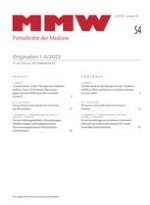Erschienen in:

07.07.2023 | Insuline | FB_Originalie
"Unmet needs" in der Therapie des Diabetes mellitus Typ 2
Wie können Barrieren gegen die Insulintherapie überwunden werden?
verfasst von:
Prof. Dr. med. Jens Aberle
Erschienen in:
MMW - Fortschritte der Medizin
|
Sonderheft 4/2023
Einloggen, um Zugang zu erhalten
ZUSAMMENFASSUNG
Für die leitliniengerechte Behandlung des Diabetes mellitus Typ 2 empfehlen die diabetologischen Fachgesellschaften eine schrittweise Therapieanpassung und Intensivierung, sobald die vorangehenden Therapiestufen nicht mehr zu einer guten Blutzuckereinstellung führen. Die klinische Praxis zeigt jedoch, dass die empfohlenen Schritte zur Therapieeskalation häufig nicht befolgt werden und eine notwendige Therapieanpassung zu spät erfolgt. Vor allem die Umstellung auf eine Insulintherapie und deren Intensivierung findet häufig erheblich verzögert statt, teilweise über Jahre, obwohl der Patient hohe Blutzuckerwerte aufweist. Außerdem ist die Therapieadhärenz unter einer Insulintherapie geringer als unter anderen Antidiabetika. Dies ist im Hinblick auf das Risiko für die Morbidität und Mortalität durch mikro- und makrovaskuläre Folgeerkrankungen problematisch.
Das als therapeutische Trägheit (engl. therapeutic inertia) bekannte Phänomen tritt vor allem bei chronischen Erkrankungen auf. Die Gründe hierfür sind vielschichtig und liegen sowohl auf Seiten der Patienten als auch der Behandler. Hauptgründe sind die Häufigkeit der Insulin-Injektionen und ein starres Behandlungsschema, die als unangenehm und einschränkend empfunden werden. Auch die befürchtete Komplexität der Insulintherapie, der Schulungsaufwand und ihr negatives Bild als "letztes Mittel" schrecken ab.
Ergebnisse aus Umfragen belegen, dass Patienten und Ärzte seltener zu verabreichende Injektionen bevorzugen würden. Die Erfahrungen mit einmal wöchentlich applizierten Glucagon-like Peptid-1-Rezeptoragonisten (GLP-1-RA) sind ermutigend hinsichtlich ihrer Wirksamkeit, Adhärenz und Patientenzufriedenheit. An neuartigen Insulinanaloga mit einmal wöchentlicher Anwendung wird zurzeit intensiv geforscht.
Schlüsselwörter: Adhärenz, Basalinsulin, Diabetes mellitus Typ 2, therapeutische Trägheit, wöchentliche Behandlung
Eingereicht am 18.1.2023 - Revision akzeptiert am 6.2.2023












